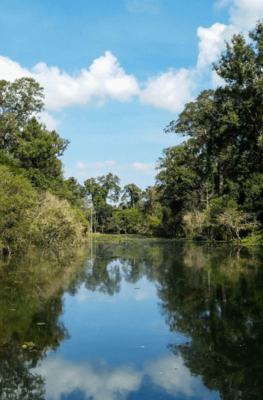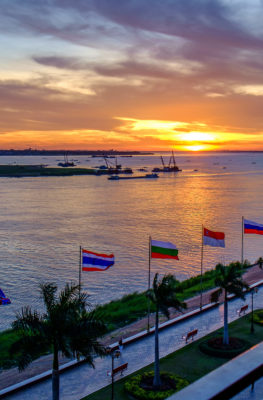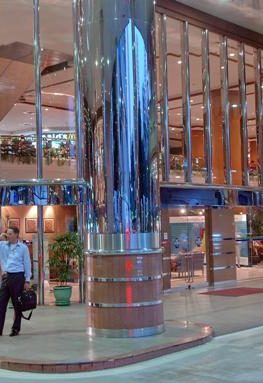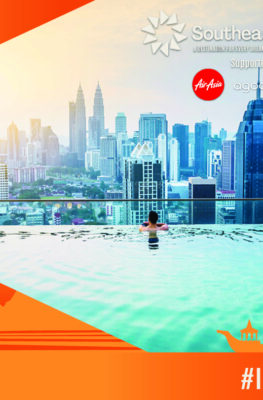Published on July 1, 2021
Cambodia’s rural landscape has made it an excellent location for ecotourism experiences, from activities in the countryside to learning about its flora and fauna. You can stay with a local family in homestays in small villages such as Banteay Srei and Chambok. There are opportunities to learn about preserving endangered wildlife in Kratie and the Phnom Tamao Wildlife Rescue Center. With many opportunities to learn about the locals’ way of life and preserve Cambodia’s natural beauty, here are some places in the country you should visit on your next ecotourism trip in Southeast Asia.
Waterfalls at Chi Phat | Instagram @charly_goguely
Chi Phat
Located in the heart of the Cardamom Mountains, Southeast Asia’s largest rainforest, is the Chi Phat community. The area is full of lush forests, grasslands, and mountains home to rare flora, fauna, and wildlife. The Wildlife Alliance, a community-based ecotourism project, partnered with the local community to provide exciting experiences to visitors while preserving the environment. With more homestays opening up in the community over the past few years, visitors can take tours from villagers for trekking, camping, hiking, riverboat tours, and other activities.
Trapeang Sangkae | Facebook Trapeang Sangkae Community Based Ecotourism-Kampot
Trapeang Sangkae
About 4 miles away from Kampot is the Trapeang Sangkae Community. The main initiative of the community is to save the mangroves that serve as a shelter to fish and squid to improve the fishing communities in the area. The villagers have been cultivating mangroves in self-made nurseries near the river, with over 1,200 trees planted. Visitors can stay in bungalows and participate in several activities, including planting mangrove trees, kayaking, going on day trips with local fishermen, and swimming in the lake. All proceeds from homestays go back to the community.
Elephants at the Phnom Tamao Wildlife Rescue Center | Instagram @phnotamao
Phnom Tamao Wildlife Rescue Center
Just 25 miles south of Phnom Penh is the Phnom Tamao Wildlife Rescue Center. The center was established in 1995 with over 6,000 acres of protected regenerating forest and the country’s largest zoo. The Wildlife Alliance has worked tirelessly to rescue, rehabilitate, and conserve Cambodia’s endangered and rare wildlife, including elephants, tigers, and Malayan sun bears, to name a few. They offer a ‘Day in the Life of a Zookeeper’ program that allows visitors to feed elephants and baby macaques and get up and close to tigers and leopards. All the proceeds from the program get used to fund the zoo.
Banteay Srei | Instagram @songsaareserve
Banteay Srei
If you want to experience local life in Cambodia, visit the Banteay Srei District outside of Siem Reap. In 2016, the Visit Banteay Srei project was launched with local villagers offering homestays to welcome visitors. Activities that visitors can partake in include learning about rice cultivation, cycling trips, village walks, and trekking to Banteay Srei temple, also known as the Jewel of Angkor. It is not overrun with tourists like other temples in Cambodia, making exploring the site more enjoyable.
Kiriom National Park | Visit Southeast Asia
Kirirom National Park
Kirirom National Park is like a breath of fresh air with cooler temperatures and immersive nature experiences. In 2002, the Chambok Community Protected Area was established to protect the forest area of Chambok. Within the ecotourism site, visitors can stay in local homestays, where local families take care of them and teach them how to maintain a small vegetable garden. Visitors can also converse with the locals, trek through the forest, take cooking classes, and learn traditional dancing.
Botum Sakor National Park | Instagram @lin.zou.0125
Botum Sakor National Park
Located west of the Koh Kong province is Botum Sakor National Park. As one of Cambodia’s largest and most biodiverse national parks, Botum Sakor is home to an incredible array of wildlife, including clouded leopards, Asiatic black bear, slow loris, and hog deer. The moist environment and undisturbed nature have allowed the wildlife to thrive. Combining a great variety of ecosystems and pristine conditions makes Botum Sakor one of the ideal destinations for those looking to connect with nature and its inhabitants in Southeast Asia.
Irrawaddy Dolphins | Instagram @the_school_of_nature
Kratie
Off the beaten path in Cambodia is a sleepy Mekong River town in the rural province of Kratie. The town has some beautiful French and Khmer architecture and roads, which gives the town a pleasant feel. When visiting, one of the most beautiful animals you can encounter is the endangered Irrawaddy dolphin in the Mekong River. With only around fifteen to twenty dolphins remaining, there’s hope that their population will slowly increase in the near future as the local fishermen are educated about them. Learn all about the dolphins’ conservation, history, and characteristics during your trip to the largest dolphin pool in the Mekong River.
Over the past few years, Cambodia has been improving its ecotourism efforts. With lots of opportunities to learn about natural and wildlife conservation and experiencing the eco-friendly lifestyle of the locals, Cambodia should be on your list of countries to visit for your next ecotourism adventure.






